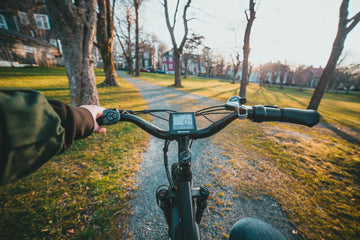Riding a bike is not always meant to be a hardcore aerobic activity—sometimes it is nice to just take a leisurely afternoon stroll with the kids. Biking with kids is a great family activity, suitable for both you and your partner. However, biking with toddlers or biking with a baby carrier must be done with extreme caution because there are many safety issues at play. When it comes to kids cycling, the American Academy of Pediatrics (AAP) recommends that children should at least reach the age of one before they go biking with a baby carrier. The reason the recommendation comes at 12 months is that by this point in a baby's development he or she can form the necessary supplementary strength to support the weight of the helmet and keep his or her head steady while riding over rough and uneven terrain—or just those nasty cracks in the cement.
However, when biking with kids, parents still need to consider whether it is appropriate to ride with their children based on their actual situations and the laws of the locality or region. Some states, for example, strictly prohibit biking with a baby carrier for children under 12 months, while other states require all children to wear helmets.
If kids cycling is on your to-do list, be sure you are taking all of the correct steps first to ensure you are biking with kids the right and safest way. Here are four important things you need to know first before biking with toddlers or kids of any age.
Choose the Right Bike Child Seats
Now that summer is on the way, it is the perfect time to get out of the house and go biking with kids. That also means being able to choose the right bike child seats. In fact, choosing the right bike child seat is vital to ensuring kids' cycling safety.
There are a couple things to consider when biking with a baby carrier. First, you must check whether a child bike seat can be added to the bicycle you are using safely. That is to say, some bicycles have maximum carrying capacities, so you need to ensure that adding a baby carrier (and the weight of a baby) will not exceed that limit.
Secondly, you need to choose the right biking baby carrier for your bike and your lifestyle. You have to choose the best child bike seat to make your ride both safe and comfortable. Essentially there are three different types of child bike seats: rear-mounted bike seats, mid-mounted bike seats, and front-mounted bike seats. For a complete guide to choosing the right bike child seat for you, check out our article 3 Different Bike Child Seats You Should Know.
BuyChildBike Helmets
Putting a helmet on a child while biking with kids is too often overlooked by parents. After all, there are already too many adults that ride bikes without proper head protection. But kids are particularly vulnerable, especially because they are not steering the bike and have no control over their own safety—that is entirely in the hands of the adults. That is why you should always equip your kids with a child bike helmet before you ride.
Because in many bike baby and toddler carriers the child's head is the predominant body part that is exposed, the helmet is a vital piece of protective gear. The most important things when it comes to child bike helmets are that they fit correctly and that they are worn correctly—those are two different issues. To get your child properly fitted for a bike helmet, visit a local specialty bike shop and have them try on different sizes and models. From there, as a parent, it will be your responsibility to ensure your kid is always wearing the helmet correctly.
Practice Riding Together
Like most activities in life, it is okay to start off small and work your way into it. In fact, with biking with kids this approach is actually encouraged. Rather than strap a baby carrier to your bike and take off down the road, it is best to practice in the park or even perhaps a residential area so that both you and your child can get the hang of it. Adding the weight of a carrier will feel disproportionately heavy at first, so practicing keeping the bike steady is important. Likewise, for your child, they will not be used to riding along with you, so giving them a chance to warm up to the activity will give you a better chance of long-term success, showing them that it is fun and safe.
Protect Your Child
Strapping your kid into a child bike carrier, fitting them for a helmet, and practicing riding with them are all positive steps for keeping them safe while you ride, but you also must make sure you have taken all other necessary precautions to protect them. These precautions include handlebars for children who are around four years old or older so that they can keep themselves steady, along with installing protective coverings over the wheels so that your kid's legs do not rub against the tire and suffer from nasty burns. The last thing you want is to overlook these potential hazards and allow them to injure your child and ruin the activity of cycling together.
Ultimately, biking with a baby carrier or biking with toddlers can be a fun and entertaining activity for both you and the kids, but it must be done as safely as possible. Kids cycling with adults makes memories and fills entire afternoons, just make sure you fully educate yourself on biking with kids beforehand. Once you have chosen the right bike child seat, bought your child a bike helmet, practiced riding with your child, and taking all of the necessary steps to keep them protected, riding together will become one of the most fun activities you do together.













































